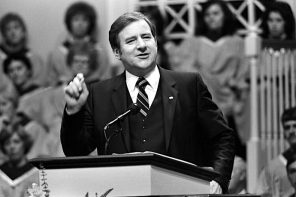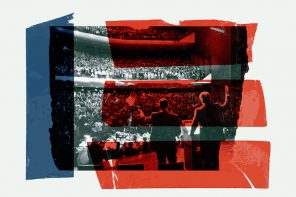Frank Bruni weighs in on Michele Bachmann’s version of Christianity, questioning how she “presents herself as a godly woman, humbly devoted to her Christian faith.” He adds, “I’d like to meet that god, and I’d like to understand that Christianity.”
It seems appropriate to give Bruni some credit for recognizing, if belatedly, something that was captured pithily in a bumper sticker years ago: “the religious right is neither.” In case you weren’t paying attention, though, Bruni, author of a hagiographic memoir of covering the campaign of George W. Bush, fills you in on what’s been happening in Republican politics over the last 40 years, a phenomenon he apparently failed to notice as he cozied up to the religious right’s 2000 and 2004 candidate of choice:
My aim here isn’t to re-litigate Bachmann’s crimes against reason and decency, all widely documented.
It’s to wonder why we accept her descriptions of herself, and in turn describe her, as a deeply religious woman. That grants too much credence to her particular, peculiar and highly selective definition of piety. And it offends the many admirable people of faith whose understanding and practice of religion aren’t, like hers, confrontational and small-minded.
Bachmann is an evangelical, and has spoken rhapsodically about the experience of being born again. After that moment, she said, “I absolutely understood sin, and I wanted no part of it.” She plunged into politics nonetheless.
We routinely place her in the “religious right,” a phrase that frustrates me, tidily linking a certain set of political beliefs with profound devotion. We talk much less frequently of any “religious left,” and that disparity implies that a seriously faithful person is most likely to land on just one end of the political spectrum.
Last time I checked, “religious right” was not a phrase that evoked images of piety, but rather a harsh fundamentalism. That’s why, a few years ago, the movement’s leaders made a failed effort to force the media to rebrand them with a different name. That effort didn’t go anywhere, because, as Steve Benen noted at the time, the “label isn’t the problem. The dangerous and divisive agenda is.”
Bachmann, of course, represents a particular creature of the religious right: not one, like Bush, who learned to pander to both the grassroots and the grasstops with expressions of piety, devotion, personal salvation, and American exceptionalism, but one incubated in the institutions that were created precisely for the purpose of training future leaders schooled in the “Christian worldview.” Her Christian legal education, which I wrote about here last summer, as well as her commitment to the conspiratorial, Cold War-era-inspired Summit projects, which I wrote about here, all shaped the future politician who cut her teeth in the school board wars and worked her way up to a seat in the House of Representatives. All according to plan, even if now her fellow Republicans are suddenly alarmed by her unabashed, McCarthy-esque extremism.
Bruni wonders why “we” (it’s not clear whether he’s referring to the public or the press or both) don’t talk more about the religious left, a “disparity [that] implies that a seriously faithful person is most likely to land on just one end of the political spectrum.” Again, I’m not sure who the “we” is here; part of the reason the press, at least, talks so much about the religious right is because 1) the movement has a remarkably good media and public relations machine; 2) its agenda threatens the separation of church and state; and 3) one of the two major parties is completely reliant on its well-honed get-out-the-vote apparatus. Do “we” talk about it as if it reflects a superior piety to other religious Americans? I’m not sure who that “we” Bruni has his ear cocked to is.
Bruni highlights the Nuns on the Bus movement and the fact that some religious denominations perform same-sex marriages to demonstrate that seriously religious people have political (and religious) views that run counter to those of the religious right. I actually think these movements have received a great deal of positive coverage of late; one need look no further than polling data on attitudes toward LGBT people and same-sex marriage to realize who the ideological (if not legal, at the moment) victors are there. More broadly, one of the reasons why there is not the clearly identifiable religious left that Bruni pines for is the criticism of the religious right itself: many progressives who are religious reject entangling religion and politics. What’s more, as Cathy Lynn Grossman reported last week at USA Today, “Unbelief is on the uptick. People who check ‘None’ for their religious affiliation are now nearly one in five Americans (19%), the highest ever documented, according to the Pew Center for the People and the Press.”
One final note: in a democracy, and one in particular that protects religious freedom, it’s a risky business defining who are the “real” Christians, particularly when religion is being politicized. Michele Bachmann is wrong, politically speaking, not because she has a different view of Christianity than Frank Bruni. She’s wrong because she’s exploiting a particular conservative and literalist version of religion to undermine democratic principles and upend the constitutionally-mandated separation of church and state. “We” have been talking about that for quite some time.




